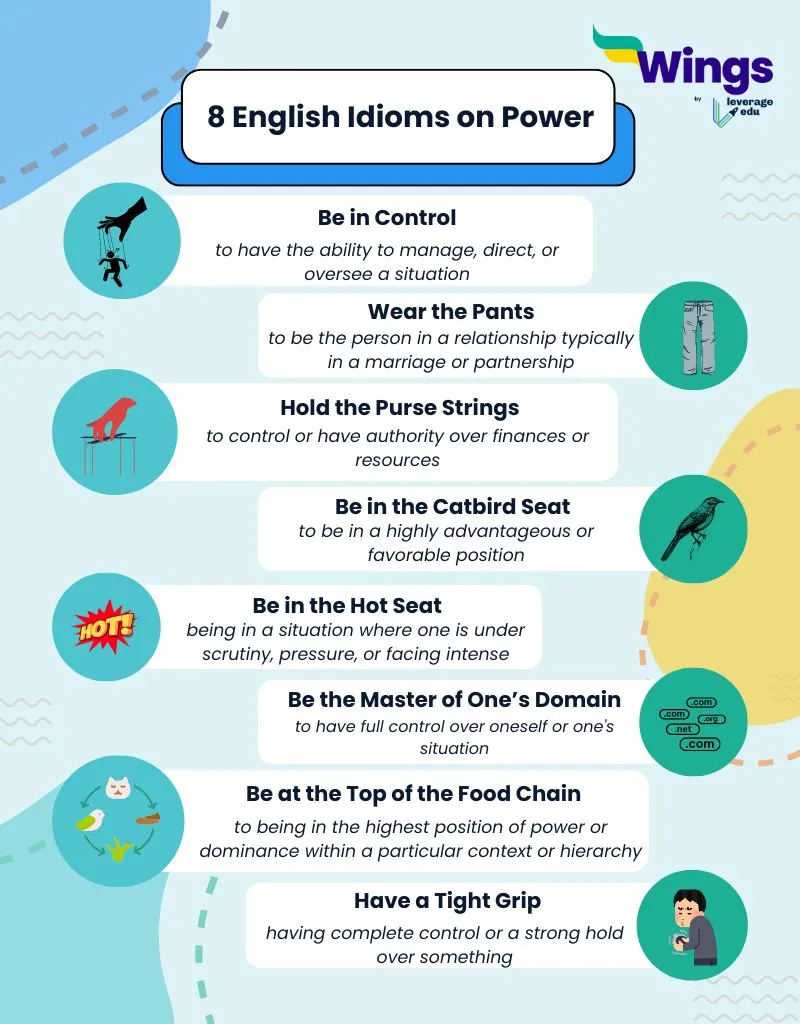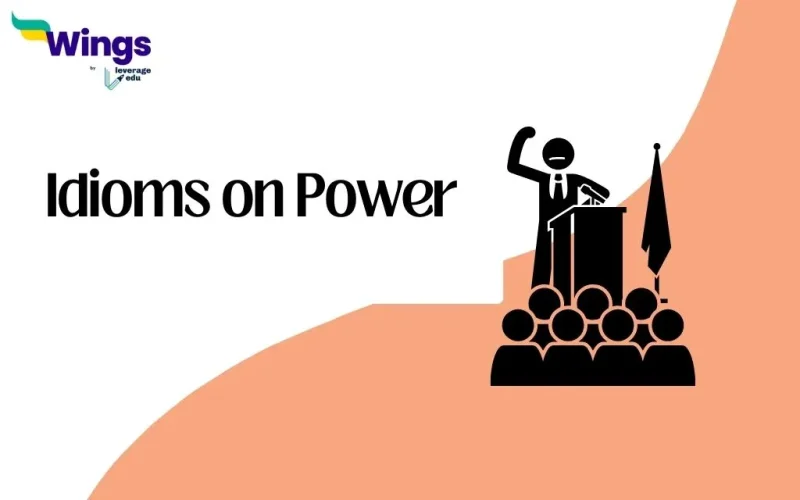English idioms often reflect power dynamics by clearly expressing ideas of control, authority, and influence in everyday situations. From calling the shots to holding a firm grip, these expressions show how power is exercised, maintained, or challenged in different contexts. Understanding such idioms strengthens language comprehension and helps convey authority and influence more effectively in daily communication. This article on Idioms on Power introduces key idioms on power, explaining their meanings with simple examples to show how they represent real-life situations.
This Blog Includes:
Idioms on Power: Meaning and Usage
Building on the earlier overview of how English idioms reflect power dynamics, this section moves into practical usage. The idioms discussed below highlight authority, control, influence, leadership, and dominance as they appear in everyday situations. By examining their meanings and usage, readers can see how these expressions bring clarity and strength to communication involving power.
1. Control and Authority
The Control and Authority category includes idioms that describe situations where a person or group has direct control over decisions, actions, or resources. These expressions are often used in professional, organisational, and leadership contexts.
| Idioms on Power | Meaning of the Idiom | Example Sentence |
| Hold all the cards | To be in a position of complete control or advantage. | The company held all the cards during contract negotiations. |
| Call the shots | To make important decisions and give directions. | As project manager, she calls the shots. |
| Run the show | To be fully in charge of how something operates. | After the director left, the assistant ran the show. |
| Hold the reins | To control or lead an organisation or activity. | The founder’s son now holds the reins of the business. |
| Have the final say | To possess ultimate decision-making authority. | The editor has the final say on all articles. |
| Be in the driver’s seat | To be in control of a situation or outcome. | With funding secured, the investors were in the driver’s seat. |
| Hold the purse strings | To control financial decisions and spending. | The finance department holds the purse strings. |
2. Influence and Advantage
Idioms in the Influence and Advantage section describe situations where someone may not have full authority but still holds a strong influence or a strategic advantage that affects outcomes.
| Idioms on Power | Meaning of the Idiom | Example Sentence |
| Have the upper hand | To have an advantage over others. | The firm had the upper hand due to exclusive rights. |
| Have clout | To possess strong influence or authority. | Senior officials with clout shaped the final decision. |
| Have leverage | To have an advantage that allows influence. | Workers gained leverage as deadlines approached. |
| Carry weight | To have importance or influence in decisions. | Her opinion carries weight with the board. |
| Hold sway | To exercise influence or control. | Traditional values still hold sway in rural areas. |
| Sit in the catbird seat | To be in a highly advantageous position. | With multiple offers, she sat in the catbird seat. |
3. Dominance and Leadership
Dominance and Leadership idioms highlight clear dominance, authority, or leadership where one individual or group clearly stands above others.
| Idioms on Power | Meaning of the Idiom | Example Sentence |
| Rule the roost | To be the dominant authority in a group. | He rules the roost in the family enterprise. |
| Be top dog | To be the most powerful or important. | The brand became top dog in the market. |
| Be king of the hill | To be the most dominant or successful. | The firm was king of the hill for years. |
| Reign supreme | To be unmatched in power or success. | The athlete reigned supreme for a decade. |
| Rule with an iron fist | To govern harshly with strict control. | The ruler governed with an iron fist. |
4. Hidden or Indirect Power
The Hidden or Indirect Power section includes idioms that describe influence exercised quietly, without holding an official or visible position of authority.
| Idioms on Power | Meaning of the Idiom | Example Sentence |
| Pull the strings | To secretly control events or people. | An advisor was pulling the strings behind the scenes. |
| Be the power behind the throne | To control decisions while someone else appears in charge. | The strategist was the power behind the throne. |
5. Aggressive Use of Power
Idioms in Aggressive Use of Power reflect power used forcefully, strictly, or in an intimidating manner, often creating pressure or fear.
| Idioms on Power | Meaning of the Idiom | Example Sentence |
| Throw your weight around | To use power aggressively or unfairly. | The supervisor threw his weight around at work. |
| Crack the whip | To enforce strict discipline. | The coach cracked the whip before the tournament. |
| Flex your muscles | To openly show power or strength. | The union flexed its muscles during talks. |
6. Personal Control Over Others
Personal Control Over Others idioms describe situations where one person has strong influence or control over another individual.
| Idioms on Power | Meaning of the Idiom | Example Sentence |
| Have someone under your thumb | To completely dominate or control someone. | The leader kept the press under his thumb. |
| Have someone in the palm of your hand | To have total influence over someone. | The speaker had the audience in the palm of his hand. |
| Twist someone around your little finger | To influence someone easily. | The child twisted her grandparents around her little finger. |
7. Decision-Making Power
The Decision-Making Power category focuses on idioms that emphasise authority in making final decisions or enforcing rules.
| Idioms on Power | Meaning of the Idiom | Example Sentence |
| Have the last word | To make the final decision or statement. | She usually has the last word in meetings. |
| Lay down the law | To state rules firmly and demand obedience. | The principal laid down the law on discipline. |
| Pull rank | To use authority to assert control. | The officer pulled rank to end the dispute. |
8. Symbolic or Figurative Power
Symbolic or Figurative Power idioms describe power expressed symbolically or within relationships rather than formal authority.
| Idioms on Power | Meaning of the Idiom | Example Sentence |
| Hold court | To be the centre of attention while influencing others. | The expert held court at the conference. |
| Wear the pants | To be the main decision-maker in a situation. | She wears the pants in household decisions. |
Also Read: Idioms with Examples

How to Use Power-Related Idioms on Power Correctly
Following the discussion on how idioms convey different forms of power, it is equally important to understand how and where these expressions should be used. Power-related idioms commonly appear in everyday conversations, workplace interactions, media commentary, and informal writing to describe authority, influence, or control in an engaging way. They work well in narratives, speeches, and opinion-based content where expressive language adds clarity.
Most of these idioms are informal and are better suited to spoken English, blogs, and general communication. In academic or professional writing, where precision and formality are essential, such expressions should be used carefully or avoided. To prevent misuse, the idiom must match the context and support the message, rather than replacing a clear explanation, ensuring that communication remains accurate and effective.
Common Mistakes to Avoid While Using Idioms on Power
Building on the earlier discussion of when and where Power-related idioms should be used, it is equally important to understand the errors that arise from incorrect usage. Common mistakes to avoid while using idioms on Power help ensure that expressions of authority, control, and influence remain clear, accurate, and appropriate.
- Idioms on Power should not be translated word-for-word, as their meanings are figurative rather than literal.
- Using a Power idiom in an unsuitable context can distort the intended sense of authority or dominance.
- Many idioms have fixed forms, so incorrect tense or structure can make usage sound unnatural.
- Improper sentence placement may disrupt flow and reduce clarity.
- Overusing power-related idioms in academic or professional writing can weaken precision and formality.
Explore: Examples of Academic Phrases in English
Learning idioms on power plays an important role in understanding how authority, control, and influence are expressed in everyday English. These idioms add depth to communication and help convey leadership, confidence, and decision-making more effectively across personal and professional contexts. When used correctly, they allow speakers and writers to express complex power dynamics in a clear and engaging manner.
Related Reads:
FAQs
Ans. As a form of figurative language, they serve as a potent communication tool when applied effectively. Idioms effortlessly infuse conversational flair into writing, making it less formal and more engaging, especially useful for transforming technical or rigid content, like blog posts or emails.
Ans. An idiom for controlling someone is under someone’s thumb. This phrase denotes being under the control or influence of another person. It often carries a negative meaning, suggesting that someone is in a situation where they lack autonomy or are heavily influenced by someone else.
Ans. Vocabulary idioms refer to expressions or phrases in language that carry figurative rather than literal meanings, often rooted in cultural context. In English, these idioms not only offer advice but also convey deeper principles and values in straightforward terms.
Ans. Idioms on power help learners understand how authority, control, and influence are expressed naturally in everyday English. Idioms on English, improve comprehension of spoken and written communication and make language use more expressive and confident.
Ans. Most idioms on Power are informal and are best suited for conversation, blogs, and general writing. In academic or professional contexts, idioms on Power should be used carefully and only when they enhance clarity without reducing formality.
This was all about idioms for power. You can also follow the Learn English page of Leverage Edu for more exciting and informative blogs related to English grammar and the English language.


 One app for all your study abroad needs
One app for all your study abroad needs












 60,000+ students trusted us with their dreams. Take the first step today!
60,000+ students trusted us with their dreams. Take the first step today!